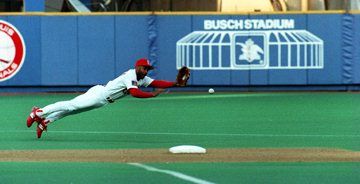Here's a player I feel is "underrated." He may belong in the Hall, he may not. The point is, he was a fine player for a long time and his contribution to the game should not fade into obscurity. We'll compare him with two contemporaries. It is not meant to be an exhaustive, Jamesian-like study, merely an overview of their careers and rankings.
PLAYER A
The first candidate has impressive credentials at any level. Whether the talk has turned to those who should be enshrined or just very good players that should be remembered. See if you know who I'm talking about before hitting the Baseball Encyclopedia.
His career credentials;
In the top 50 (more than 2,700)for hits;
Top 50 for doubles;
Top 30 for Homeruns;
Top 30 for Runs Batted In.
Add to that, 300+ Stolen Bases, Gold Gloves, an MVP and a Rookie of the Year Award. His weaknesses? He didn't walk much. He didn't strike out too much for a power hitter, but he didn't draw many base on balls. Also, he routinely missed 20+ games a year for injuries. He played 17 full seasons.
PLAYER B
Player A is an impressive player. As a comparison, lets look at a contemporary. We'll call him Player B. Player B played in 19 full seasons. Player B was an excellent player for many years. His career rankings are:
Top 20 for hits (over 3,000):
Top 25 for doubles;
Top 25 for Homeruns;
Top 15 for RBI's;
Add to that, Gold Gloves and more than 200 Stolen Bases. Player B also struckout more than he walked, but Player B walked a bit more than Player A. Obviously, Player B's career rankings are better than Player A. Still, out of anyone who has ever played the game, Player A is in the top 50 or better in some important categories.
Player A and B played the same position and their careers overlapped. Player B is talked about as a great player (deservedly so). Player A is not discussed much at all.
I should add all of these players conducted themselves on and off the field like true gentlemen.
PLAYER C
Finally, we come to Player C. Player C is also a contemporary of A and B, although he played a different position. Player C surpasses A and B in one offense category, stolen bases. Player C has:
300+ fewer hits than Player A;
100 fewer doubles;
Half as many RBI's;
400 fewer Homeruns;
A lower batting average.
Player C set the defensive gold standard for his position. Player A was an excellent fielder and no matter how good C was defensively, he was no offensive threat.
Player B and Player C are in the Hall of Fame.
Player A is.....

Player B is....

Player C is....

I'm not arguing that Dawson was as good as Winfield. I am arguing that if you can stand toe-to-toe with a contemporary (righthanded hitter, five category player, rightfielder...) who is in the Hall of Fame, and still look good, you're one hell of a ball player. Dawson deserves mention when great players of the 70's and 80's are discussed.
I am also not running down Smith. Smith was unparalleled with the glove and, when older, he contributed offensively. His job, unlike Dawson and Winfield, was not to drive in runs as such and I am not penalizing him for his lack of power. It's just that taken as a whole, Dawson was a five category player who did everything quite well. Outside of defense, Ozzie's main contribution was speed and Dawson was no slouch on the basepaths.
Dawson's name rarely comes up when talking about players of his era. That's a shame. He was an excellent ballplayer for many years.
I think Dawson suffers from what many five-category players suffer from: he did everything well, but did not excel at one particular thing. He was never a 40+ homerun threat (only one year, and then he played in Chicago) but he consistently hit 20 to 30 homeruns. He never stole 50 bases, but was a consistent threat on the basepaths. He never hit .335, but hit over .290 on many occasions.
Sports writers can go into ecstasies about Mo Vaughn in his prime because of Vaughn's power. I'd take Dawson without a thought. I don't think I'd regret the decision.


No comments:
Post a Comment